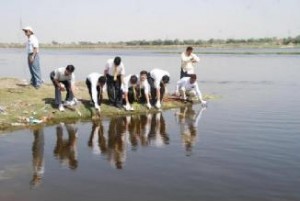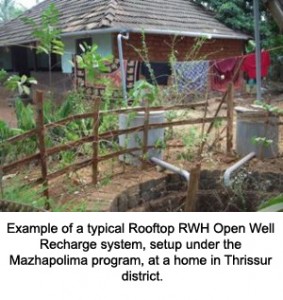/topics/government-programmes
Government Programmes
Agra: Yamuna river trash cleanup 2009
Posted on 23 Apr, 2009 11:45 AMAhead of the Lok Sabha polls, hundreds of students of several schools along with senior citizens cleaned up Poiya Ghat Sunday morning, picking up rags and used polythene bags, to focus attention on river pollution which candidates of various political parties have chosen to ignore.
Brij Khandelwal, programme convener of the Yamuna Foundation and Rivers of the World Foundation, said apart from students involved in the My Clean Agra initiative, a large number of other voluntary groups and organisations were involved in Sunday's programme which specifically targeted the politicians for failing to clean up the cities and the rivers of India.
"No political party has bothered to say a word about how they would save a dying river and rejuvenate it or restore its original glory," said Subhash Jha and Haridutt Sharma of the Yamuna Foundation for Blue Water.
"Mazhapolima"? : Participatory well recharge programme in Thrissur district, Kerala, part 2
Posted on 13 Apr, 2009 03:35 PMThe Mazhapolima program is quite unique; it aims to (eventually) recharge about 4.5 lakh dug wells in the district, and do this through community awareness and action. It's driven by the District Collector, Mr. Kurian Baby, who strongly advocates sustainable, local development & innovation.
A Gram Panchayat (GP) in Kerala is fairly large, and has a population of approximately 20000 people, as compared to about 10000 in Karnataka, and about 700 in Uttar Pradesh. GP's have ward divisions, about 20 of them per GP. Each GP has a staff of at least 6-8 people. The GP that we visited - Adat, had about 12 employees , 4 lower division clerks, 3 upper division clerks, 1 Joint Secretary, 1 Secretary, 2 peons and 1 sweeper. Except for the peons and the sweeper, the employees are all usually SSLC-pass, but here in Adat they were mostly graduates. For salaries alone, the GP spends about Rs 1.5 lakhs per month. Adat GP executed 124 projects last year. The GP's annual budget was Rs 1.40 crores, not including NREGA funds. Out of this, Rs 40 lakhs was raised by the GP through property taxes etc. Most other parts of the country, GP budgets are only about 5 to 10 lakhs. The Adat GP office was a large 2 storeyed building. Mr Vijayan, the Joint Secretary proudly showed us their awards, which filled up an entire wall.
National rural water supply programme - Framework for implementation (2008-12)
Posted on 03 Mar, 2009 01:36 AMNew guidelines have been released by the Department of Drinking Water Supply, Ministry of Rural Development (GoI), towards ensuring drinking water security in rural areas. This programme is being taken up under the Rajiv Gandhi National Drinking Water Mission (RGNDWM). The Department of Drinking Water Supply (DDWS) is the nodal department in the Ministry of Rural Development (MoRD) in the Government of India, providing scientific, technical, and financial assistance to the states in the drinking water and sanitation sector. Access the guidelines here: National Rural Water Supply Programme Guidelines - 2008
Jan Jagaran Abhiyan uses the MGNREGS to mobilize and empower villagers in Bihar
Posted on 01 Mar, 2009 03:18 AMThe Jan Jagaran Abhiyan (JJA) is a nascent group working in Araria, towards creating a just and equitable society. It is led by young, committed professionals who are looking to work in the challenging socio-economic context of the state of Bihar.
Press releases - Ganga river basin authority : SANDRP
Posted on 26 Feb, 2009 10:47 AM
A series of Press Releases from sources indicate the progress on the matter of the Ganga River Basin Authority. It makes for an informative read with a candid discussion in the comments section!
Ganga River Basin Authority for Comprehensive Management of the Ganga Basin
PIB Friday, February 20, 2009
Ministry of Environment and Forests
AUTHORITY ENSURES DEVELOPMENT REQUIREMENTS IN SUSTAINABLE MANNER ENSURING ECOLOGICAL FLOWS IN GANGA
The Government today announced the setting up of a National Ganga River Basin Authority. A statement to this effect was made in Parliament by Shri Namo Narain Meena, Minister of State in the Ministry of Environment & Forests. A Notification in this regard is also being issued by the Government.
Overview of the 2008 Kosi flood situation from Samajik Shaikshanik Vikas Kendra
Posted on 02 Feb, 2009 09:01 PMThe following article is the latest update of an overview of Kosi floods by SSVK. It reveals the ineffective handling and inadequate supply of materials by the Government in the flood hit regions. It also points out the activities done by various organizations and SSVK itself.
Press Release by SANDRP: Why does our Govt have no value for rivers ?
Posted on 08 Jan, 2009 10:32 AMA two day National Workshop on need for policy and legal norms for allowing freshwater flows in Rivers in India on January 3-4, 2009 at Bangalore ended with a unanimous demand that governments must allow continuous, sustained freshwater flows in all perennial rivers of India, whenever, a dam, diversion or hydropower project is planned, constructed or operated. Inaugurating the workshop on the morning of January 3, 2009, Shri L C Jain, former member, planning commission of India (and many other important posts), expressed his pain and anguish on the state of India's Rivers, "It is very disturbing that the acts of commissions and omissions of the authorities have ruthlessly, blindly, heartlessly lead todestruction of almost every major rivers of India. The hearts of the officials and ministers should throb for the millions depending for their needs and livelihoods on the rivers, but it seems that the stones of the South and North block buildings have entered their hearts." Quoting Gandhiji's agenda for the economic independence of India from what he wrote in the Young India on November 29, 1929, Jain said, Land, Water and Air cannot be subject of commerce, but the planners lock up the pain, hunger, malnutrition in the paragraphs of their five year plan documents and do not ensure their inclusion in their actual plans and programmes. He expressed his deep anguish that even the recommendations of the official policies and committees on ensuring freshwater flows in the rivers remain unimplemented.
Preliminary consolidated report on the effect of climate change on water resources, prepared by the Central Water Commission and the National Institute of Hydrology, under the guidance of the Ministry of Water Resources in 2008
Posted on 05 Jan, 2009 11:22 AMThe Preliminary Consolidated Report on the Effect of Climate Change on Water Resources, prepared by the Central Water Commission and the National Institute of Hydrology, under the guidance of the Ministry of Water Resources in 2008, is one of the first official reports made available by the Government of India, of a reliable quantitative assessment based on field data, of the likely effect of climate change on the availability of water resources, i.e. on the glaciers and snow melt, on rainfall and their effect on run off into the river system and their contribution to ground water. In the Report, an attempt has been made to give a brief account of the available studies on possible impacts of climate change on India's water resources, change in India's water needs, climate of India, river basins of the country, present water resources and future demand and supply, impacts of projected climate change and variability, and associated hydrological events and likely vulnerability of regional water resources to climate change. Identification of key risks, research needs and prioritisation of mitigation strategies has also been discussed. Access the report here: Preliminary Consolidated Report on the Effect of Climate Change on Water Resources
Kosi rehabilitation policy document from the Bihar Government
Posted on 15 Dec, 2008 11:05 AMThe document can be downloaded as a PDF here (Hindi): Kosi rehabilitation policy document
Kosi disaster: The rehabilitation & reconstruction policy
National Urban Sanitation Policy
Posted on 01 Dec, 2008 01:16 PMThe Government of India, Ministry of Urban Development recently released the National Urban Sanitation Policy. We attach the document below, as well as key excerpts. We request you to add your comments below regarding the provisions of the Sanitation Policy. Click here to view the National Urban Sanitation Policy The document is quite comprehensive and detailed. It lays out a vision for urban sanitation in India. It instructs states to come up with their own detailed state-level urban sanitation strategies and City Sanitation Plans. It moots the idea of totally sanitised and open-defecation cities as a target and the setting up of a multi-stakeholder City Sanitation Task Force to achieve this. Environmental considerations, public health implications and reaching the unserved and urban poor are given significant emphasis in the policy. Funding options are laid out including direct central and state support including through existing schemes, public-private partnerships, and external funding agencies. It directs that atleast 20% of the funds should be earmarked towards servicing the urban poor. The Center also plans to institute awards to the best performing cities, reminiscent of the Nirmal Gram Puraskar awards for villages. Important Excerpts from the Policy:








